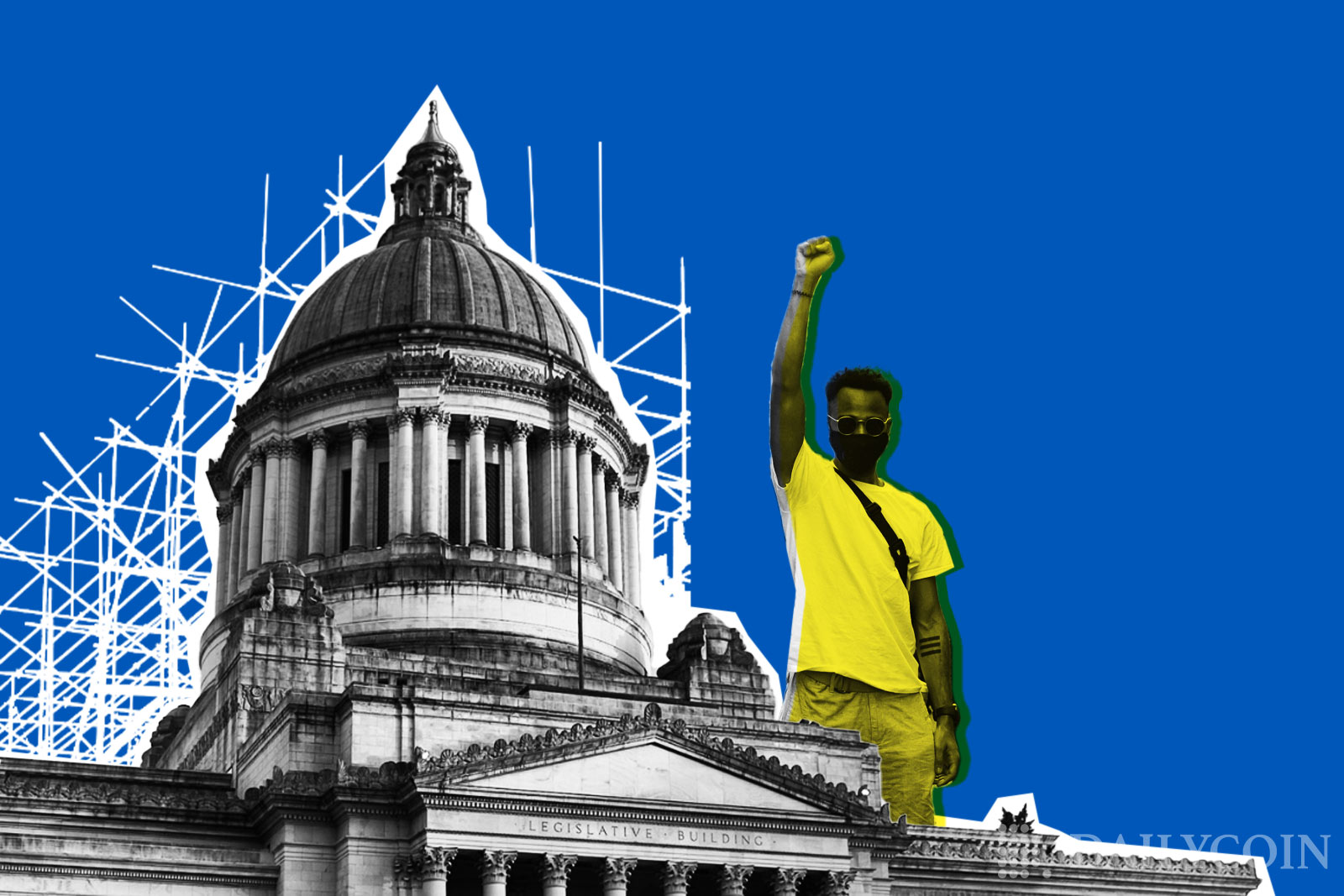
Cryptocurrency has a regulation problem, and the ecosystem may be stranded if it doesn’t solve this issue. Crypto, by design, is a regulator’s nightmare. It’s transnational and not beholden to any institutional control, so it’s extremely difficult to regulate. Asides from that, decentralized currencies exist in a money market only regulated by the market, not the state. This means that they are fundamentally incompatible with regulatory pressure.
The question of regulation has hung over the head of the crypto ecosystem like the sword of Damocles. It dropped in 2017 when South Korea made a move to regulate Bitcoin. As a result, the entire ecosystem saw a massive dip. The sword dropped again in November 2019 when the Chinese government made a move to regulate cryptocurrencies as a whole. That episode saw Bitcoin sink to a six-month low.
If crypto is to continue its upward growth, it will need to solve the problem of regulations. And this article proposes to solve that problem in the only way crypto knows how, through decentralization.
Crypto Regulations Are Difficult by Design
There are many ways to explain why crypto is difficult to regulate. Like Perry Woodin, the CEO of Node40, has said, one could argue that it’s a fundamentally technical problem. On the other hand, like Marco Santori, an American banker, has said, one could argue that it’s a categorization problem. One could even argue that it’s a problem of political will. But all those explanations led to the same answer; crypto is quite difficult to regulate, and not one authority has gotten it right.
Sponsored
While many countries have passed laws regarding crypto, those laws are easily circumvented. One could hold ten million dollars in Bitcoin without having to tell a single soul about it. And if one were just minimally careful about keeping their private keys, not even a police raid could deliver those keys to the government. There’s no paper trail, there are no witnesses, and there’s nothing but a bunch of code keeping those assets in check. It’s nothing but a regulatory nightmare.
In cases where people can’t just hide their involvement in crypto, they can simply move overseas. When the Chinese government banned crypto in 2021, all they did was just force users underground. According to experts, all the large-scale miners of the currency simply moved it overseas.
Sponsored
The ban was also ineffective at stopping people from actually buying crypto, since it’s almost unenforceable. Since the business of crypto is virtual and not location-specific, it’s near impossible for any one agency or government to even propose an effective regulation for it.
No Regulation, and Plenty of Problems
The average crypto enthusiast would tell you that all of this is a good thing. They would argue that crypto is working just as well as it should and that regulatory oversight should never become a thing. And that does make sense in a lot of ways. After all, how can we be sure that the people regulating crypto even know what they are doing? They are the same agencies regulating centralized finance, and as recurrent economic crashes have shown, they hardly know what they are doing.
But we must also realize that crypto is also suffering from a lack of regulation. A good example of why we need those regulations is the NFT craze. In 2020, we saw the birth of a lot of useful NFT projects. However, by the end of 2021, almost every NFT project was a pump-and-dump scam. These scams not only dented the image of NFTs, but they also dented the image of the Web 3.0 economy in general.
It’s easy for crypto enthusiasts to argue that people should do their research when investing, but how useful can that research be? How can a newbie to crypto understand the telltale signs of a fraudulent project?
Asides from that, cryptocurrencies are still growing. The adoption rate of crypto globally is around 4.2%. If the ecosystem will ever convince a majority of people to ditch traditional finance, it does need to provide some guardrails. People don’t enjoy doing tons of research before choosing a bank or investing in a venture. They prefer having a guarantee that their money will not erratically disappear. And they prefer knowing that if they are defrauded, they at least have a chance of getting some of that money back.
A cryptocurrency ecosystem that is systematically anti-regulation cannot provide this. And an ecosystem that doesn’t provide this may find it difficult to win over the majority of the population. This means that the crypto ecosystem has to do something about regulations before it’s too late.
The Questions of Regulation
Now that it’s clear why crypto needs regulation, the question that remains is who oversees this regulation? Law enforcement agencies are probably not equipped to regulate crypto. They simply lack the necessary staff and training needed to keep up with the industry. They are also centralized behemoths, and allowing them to regulate crypto in whatever form would be subjecting the decentralization of crypto to a centralized authority. Which, of course, defeats the entire purpose.
The next question is how will this regulation be done. We all know that crypto has unique characteristics that make it almost impossible to regulate. This means that the only viable way to regulate crypto is through complete transparency, which isn’t necessarily something one finds with crypto startups these days.
This leaves us with the big question. Who can regulate crypto? And how can they regulate it? The only answer that seems to make sense right now is crypto itself.
Decentralized Regulation Agencies
If crypto firms and personnel are the only ones who have the knowledge base and skillset to regulate crypto, why can’t they do it?
Imagine a world where the majority of the biggest players in the world of crypto come together to form a protocol that allows members to vote on regulations. That framework would remove almost all the reach that fraudulent products have overnight. That framework would provide a clear regulatory pathway for future crypto innovations.
The agency itself could be a DAO. It could have its tokens, set its own rules, and allow members to decide what path it should take. The agency could conduct preliminary investigations on new crypto products and even act as a standard-setting agency. Products that pass the agency’s investigation would be boosted by it, and the ones that do not will be posted on a transparent ledger.
Thus, users will not have to scroll through hundreds of sites to do their research, as it were. They can simply access an up-to-date dossier on whatever product they are thinking of investing in.
This idea may sound radical to some, but it isn’t. Self-regulatory agencies aren’t new, and crypto self-regulatory agencies are certainly not unicorns. Japan has one already.
The Japan Blockchain Association has about 127 members and 35 crypto exchanges. This organization sets standards and promotes the development of a sound business environment. The association holds meetings about the relevance of new use cases in crypto and generally tries to raise awareness about exciting innovations in crypto.
Another great example of a self-regulatory agency is CryptoUK. CryptoUK was founded by the United Kingdom’s seven largest crypto firms and was primarily established to help people during times of crisis and hacks.
Of course, these examples aren’t robust enough to serve as a worldwide regulatory agency for crypto, but they are signs of what can happen when an industry comes together. In a democratic regulation regime, the market would be able to visibly regulate itself without any lag time. The invisible arm of the market would work immediately, as stakeholders would be able to vote on the credibility of protocols and products.
We already have examples of what that regime could look like. All that remains is whether the players in crypto have the impetus to come together and do the hard work of regulating the industry they are trying to grow.
On the Flipside
- State governments may form a transnational regulatory framework for crypto, ending the need for SEO regulatory agencies.
- If not done properly, these agencies could turn into monopolistic behemoths.
Why You Should Care
Crypto has a regulation problem, and nothing but crypto can help solve it. If the industry doesn’t solve its regulatory problem, it will be very difficult for it to grow any further.
Conclusion
Crypto has a regulation problem that it has found very difficult to solve. However, the answer doesn’t have to be out of reach. The answer to the regulatory problem of crypto could be crypto itself, and crypto stakeholders need to come together to explore that idea.
